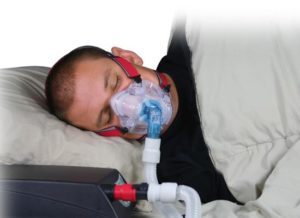Blog
Sleep Apnea and CPAP Do’s and Don’ts
If you’re suffering from sleep apnea, you’re not alone. An estimated 18 million people also suffer from this issue that can exacerbate other medical conditions, including high blood pressure and asthma. One of the best ways to combat sleep apnea is by using a device called a CPAP (continuous positive airway pressure) machine.
Being diagnosed with sleep apnea and prescribed a CPAP machine to help you breathe easier in the night can seem like a life-altering experience. Help ensure you effectively treat your sleep apnea by keeping these do’s and don’ts in mind.
Do Learn How Your CPAP Machine Works
When you get your CPAP machine, it may be intimidating, and you may not know know exactly how to use it. Rest assured your home medical equipment provider will help you with this. Basically, your CPAP machine is made up of three critical components: the blower, humidifier and mask.
Before you were prescribed the CPAP machine, you had to have an overnight sleep study. The study will determine whether or not you have Obstructive Sleep Apnea. When you’ve been diagnosed with OSA the next part of the study will have you use the CPAP mask to find out what pressure is needed to keep your airway open.
This test, which is known as a sleep titration study, will help your doctor determine which type of mask and air pressure works best for your needs. In general, there are three different types of masks available:
- Full Face Mask (covers both your nose and mouth)
- Nasal Pillows (seal at nostrils)
- Nasal Mask (covers your nose only)
Most often you will have an appointment to go to a home medical equipment provider to pick up your CPAP unit and receive instruction in use and cleaning.
Don’t Quit Using Your CPAP Machine Because It’s Uncomfortable
After a few nights of using your CPAP machine, don’t be surprised if you suffer from some annoying symptoms, including a sore throat, runny nose, dry nose, nasal congestion, abdominal distension and eye and skin irritation. Ask your provider to help you deal with these.
The discomfort associated with any or all of these symptoms might cause you to skip using your CPAP machine a few nights a week, or you might consider not using it at all. It is critical that you use your CPAP machine every night. If you are uncomfortable, you can use a few methods to help lessen any annoying risks associated with the prolonged use of the machine.
For example, if you’re suffering from skin and eye irritation, you might need to purchase a new mask, or have your current mask adjusted. Adjusting the humidifier humidity output and/or tube temperature and/or utilizing nasal spray can help lessen any nasal irritation.
There are features in your CPAP unit that can gradually build pressure or soften the exhalation pressure for increased comfort.
Do Learn How to Clean Your CPAP
Your CPAP machine can help you sleep more soundly, but only if you care for the device properly. Maintaining your CPAP machine, which includes keeping it as clean as possible, is critical to prevent the growth of mold and bacteria.
Here are some tips to help you keep your CPAP machine clean:
- Clean your mask daily. Using a damp rag with soap such as dishwashing soap clean the surface of your face mask to remove skin oils and wash your face before using.
- Perform a thorough weekly cleaning. Each week, disassemble your CPAP machine and soak the mask, tubing and humidifier chamber in warm, soapy water for at least 30 minutes. Rinse off the parts thoroughly before allowing them to air dry.
Check the filters every week, as well. There may be a washable or disposable filter depending on which brand of machine you receive.
Do Learn About Lifestyle Changes That Can Help Manage Your Sleep Apnea
In addition to utilizing your CPAP machine every night, there are other lifestyle changes that can help you manage your sleep apnea. Here are a few:
- Become a side sleeper. If you have always slept on your back, get into the habit of falling asleep on your side. This can help lessen the pressure on your airway and help you breathe better.
- Exercise daily. Get active daily to help you maintain, or even lose, some weight. Losing a few pounds can help improve your sleep apnea.
- Stay away from alcohol. Avoid drinking alcohol. Alcohol’s natural tranquilizing effect can make your sleep apnea worse.
In addition to these tips, don’t hesitate to ask your doctor or equipment provider about any changes you can make that can help you manage your sleep apnea.
Sleep apnea is a serious condition that is best treated by a few lifestyle changes and a CPAP machine. If you have any further questions, contact our professionals at Corner Home Medical.

